HOUSING WITH HOPE
Oshun opens doors for youth, turning lived experience of homelessness into action
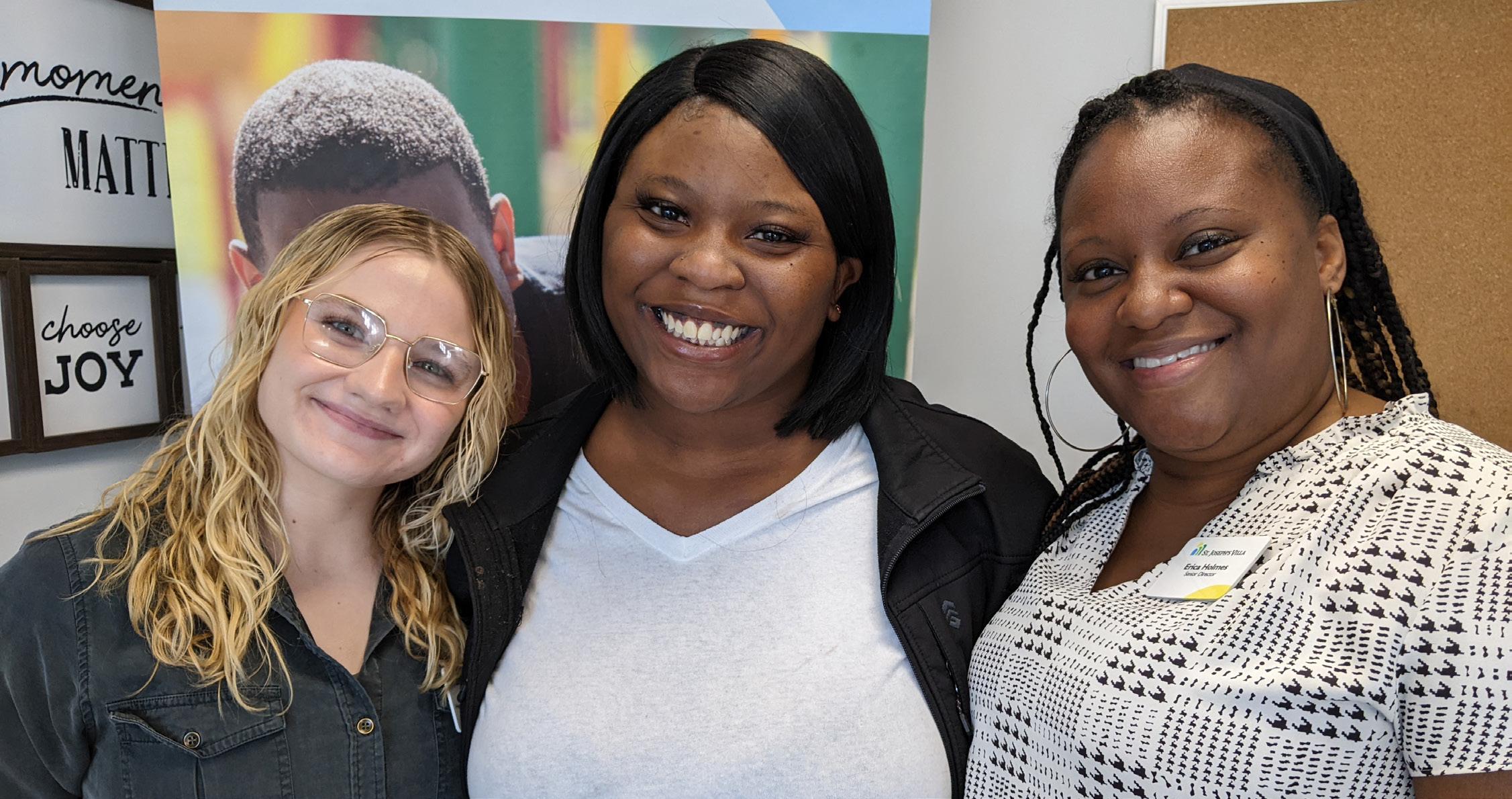
shun had barely finished high school before facing nights sleeping on the street. Kicked out of her parents’ home at 18 years old, she was left to assume responsibility for herself with nowhere to go and few she could trust. It was a scary time.
While staying at a shelter, Oshun met with her church pastor and shared her situation. Her pastor referred her to the Villa’s Flagler Housing Resource Center in Petersburg. Oshun connected with our Youth Outreach Specialist, and says that’s when everything started looking up.
“The next thing you know, St. Joseph’s Villa was calling me with great news and great opportunities.”
Oshun soon began meeting with members of the Flagler team. It didn’t take long for her to feel comfortable communicating her needs and hopes for housing. Staff allowed her to lead conversations, and presented the resources and services available to help her reach her goals. She says that she could always count on support whenever she called.
After a year participating in the Flagler program, Oshun obtained a new job, and an apartment in her own name.
“I can decorate. I have hardwood floors. I love it, I really do. It’s the best feeling to be happy.”
Now that Oshun has gained independence and reached a more stable place
in her life, she’s paying it forward by help ing other youth who are experiencing homelessness. She currently serves on the Crater Region’s Youth Action Board (YAB), a group which has been facilitated by Flagler for the last three years.
The YAB is a standing sub-committee of the Crater Area Coalition on Homelessness (CACH), comprised of individuals ages 14-24 with lived experience. Young leaders like Oshun bring a wealth of insights around issues related to youth homelessness, with the goal of guiding service providers and key stakeholders in improving the quality and effectiveness of housing interventions.
FALL 2022
The Newsletter of St. Joseph’s Villa
CONTINUED ON NEXT PAGE
Case Manager Olivia Neefe (left), Oshun, and Erica Holmes, Senior Director of Flagler Housing & Homeless Services (right)
O
Housing with Hope
“The YAB has our youth at the table, and they’re letting everyone know ‘this is what we need, and this is what we’re going through,’” said Kelly GreenBloomfield, Flagler’s Director of Program Operations. “Instead of speaking for them, they’re speaking and we’re listening.”
Flagler offers transportation for YAB members to attend meetings. For those unable to attend in person, staff ensure they have the capability to join virtually so their voice can still be heard. Oshun says she loves the meetings and interactions, and having the support of staff who can relate to their experiences.
(con’t)
Last year, HUD awarded $1.5 million for the Crater Region’s Youth Homelessness Demonstration Project (YHDP). YAB members will be at the forefront of developing a coordinated community plan to prevent and end youth home lessness, by helping select which projects submitted by service providers will be funded by the HUD grant.
For Oshun, that means an opportunity to be seen, and the chance to change lives in her community.
“I know how it feels not to have a support system,” said Oshun. “I want to make a difference for other youth so that when they need help, they’re not afraid to ask.”
The Flagler Housing Resource Center has moved! Our new offices at 24 S. Adams Street offer greater accessibility for clients and space specifically devoted to serving youth like Oshun. We’re excited about the opportunities our new location will provide to enhance service delivery for individuals and families we serve throughout the Tri-Cities region.

Veron boots up a bright future with Career & Transition Services
When Veron came to the Villa’s Dooley Center for Alternative Education, he wasn’t sure what awaited after high school. His future came into focus during a summer internship through our Career & Transition Services (CATS), where he says one-on-one time with staff helped him discover his passion for technology.


able to build skills in customer service, problem solving, communication, and inventory management.
Every Villa student has access to Career & Transition Services to help them prepare for life after school. Last year, 91% of CATS students improved employment skills and knowledge.

Veron was already good with com puters, but CATS staff helped him envision how he could turn his skills into a career. With support from CATS, Veron explored a variety of job opportunities in the field and learned about essential qualifications for joining the workforce. He also developed work readiness skills and confidence in his abilities by assisting with the Villa’s annual school supplies drive. While organizing donated supplies for over 200 Villa students, Veron was

Conversations and coaching sessions with CATS inspired Veron to raise his grades and apply to college. He began his first college courses this fall, where he plans to study coding and information security.
“It was new and different working with CATS,” he said. “They helped me think about my future, apply to schools, find out what kind of career I wanted to go into, and so much more. I really enjoyed it. The Villa helped me out a lot.”
We’re so proud of Veron, and will continue to be there for him in his next exciting chapter.
NEW
FLAGLER’S
HOME IN PETERSBURG
@craterareayab
Back to School: Supporting your child’s mental health
By Jeremy Jones, MPPA, NPML, QMHP – Director, Crisis Stabilization Unit
Going back to school can evoke vastly different emotions from students. While some children meet a new school year with excitement, others are anxious about the changes that come with returning to the classroom after the freedoms of summer. New routines. Social pressures. Bullying. Academic stress. Some students face even more obstacles when moving to a new school or community.
Each year at the Crisis Stabilization Unit, we see a surge in children’s mental health emergencies just weeks after schools reopen. More recently, an increasing number of youth have turned to substance use to cope with trauma and grief brought on by the pandemic. It is more important now than ever to build resilience, connectedness, and heathy coping strategies at home. Taking these proactive steps can help children during their transition back to school, and prepare them for a more successful year:
1. Take 5 minutes every day to solely focus on your child.
Between school, work, and screen time, it’s not always easy to find time with your child, but giving 5 minutes of undivided attention each day allows them to feel seen. It doesn’t have to be an evaluation – just be there for them. You can tell a story about yourself, joke around, or turn on music you both like. When the time is consistent and intentional, it builds trust and connection.
2. Connect your child with other trust worthy adults in your life.
One of the hardest things for parents to realize is that they don’t have to be every thing for their kids. Think about other adults who you know and trust to be extensions of yourself. As the saying goes, “It takes a village to raise a child.” Different adults can fill different roles and needs your child may have.
3. Reach out to community resources.
If you notice your child withdrawing from friends and family, or exhibiting changes in behavior, don’t hesitate to start conservations. Talk to your child, talk to their pediatrician or school counselor, or consider counseling services. The 988 Suicide & Crisis Lifeline is also a resource that connects callers with a trained crisis counselor who can provide support 24 hours a day. Don’t stop seeking help until you’re able to find what your child needs.

The most important thing to remember is: you are not alone. When you find a place where you and your child are comfortable connecting, life’s challenges – like the start of a new school year – become easier to navigate.
Jeremy Jones has 18 years’ experience of providing crisis services, residential program management, and nonprofit leadership. Before joining the Villa, he served as Senior Program Manager for Catholic Charities in Washington, DC.
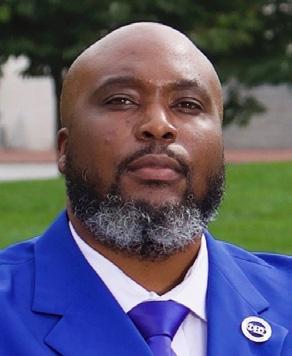
WHAT IS THE CRISIS STABILIZATION UNIT?
The Villa’s 24-hour Crisis Stabilization Unit (CSU) provides immediate care to youth ages 5 to 17, and their families, in a safe and therapeutic environment. Each child receives an assessment, individual and group therapy sessions, access to a licensed child and adolescent psychia trist, and discharge planning to facilitate a successful return home. The majority of youth served by the CSU are diverted from hospitalization.
Last year, the CSU served 174 youth and diverted 93% from hospitalization.
The CSU is located at 7700 Brook Road and has operated on the Villa campus in partnership with Richmond Behavioral Health Authority Region IV since 2012. To make a referral, contact our 24-hour call center at 804-874-9119.
 The Villa’s mental and behavioral health services take a holistic, trauma-informed approach to care for children and families.
The Villa’s mental and behavioral health services take a holistic, trauma-informed approach to care for children and families.
Villa hosts VCU Audiology’s summer camp for children deaf and hard of hearing

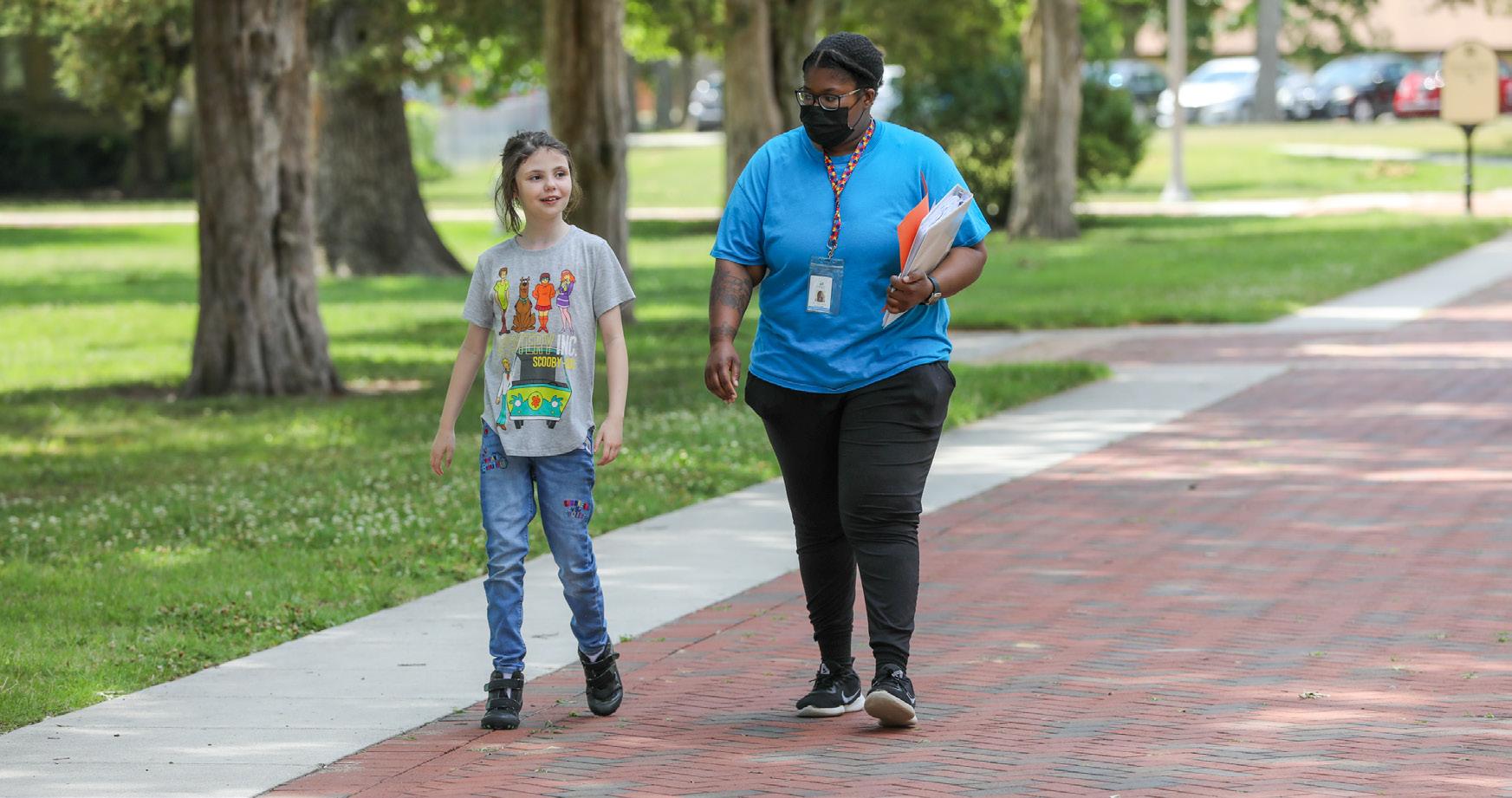
For almost a decade, kids receiving services from the VCU Audiology Department have enjoyed a unique week-long summer camp designed just for them. Camp C.H.A.T. (Children Hearing and Talking) is a free resource for families that integrates art, music, literature, and cooking activities in a cooperative environment focused on building auditory development and social skills. This summer, we had the privilege of partnering with VCU and welcoming campers to the Villa. Every one of these children uses technology like hearing aids or cochlear implants to access sound and engage the world. Campers spent much of their week at the Villa exploring our Learning & Therapy Garden, where the kiwi tunnel was a favorite spot. Between all of the activities, campers had the chance to be surrounded by other kids like them, and also appreciate the ways they stand out. Hosting Camp C.H.A.T. is a treasured highlight of our summer!



One of the biggest misconceptions about people diagnosed with autism
By Adam Dreyfus, MA, BCBA, LBA – Senior Director, Sarah Dooley Center for Autism
I’ve been fortunate to work with individuals diagnosed with autism and their families for almost two decades now, nearly half of that at the Villa. In that time, I have seen amazing growth in the general public’s awareness and understanding of autism. Due to the fact that the scientific community has, to date, not been able to determine a ‘cause’ of autism, there have always been ideas and myths associated with the complex neurological disorder.
One early myth was that autism is caused by ‘refrigerator moms’ (It isn’t). Another was that autism is caused by vaccines (It isn’t). One that is persistent and kept alive by portrayals in the media is all people diagnosed with autism are savants, like in the movie ‘Rain Man’ or the TV show ‘The Good Doctor’ (They aren’t).
But one myth that continues to come up is the idea that individuals diagnosed with autism are less interested in friendships and social connections than so-called ‘typical’ people. It has been my experience that individuals on the spectrum are very sensitive to how others feel about them and yearn, as all of us do, for a feeling of belonging and connection to others. In fact, a lot of the negative behaviors associated with autism are their attempts to foster more meaningful connections. This cuts to the heart of the core deficits associated with autism, which are challenges with communication and social skills.
Due to the nature of some of these behaviors, which can include self-injury and aggression, I completely understand how it can look like they’re asking to be left alone. I would say it’s more accurate that what they’re ‘saying’ is: I would like you to approach me differently, but that doesn’t mean I don’t want you to approach me. Or, I might not be able to ask for a hug, but I really would like to feel more connected to you.
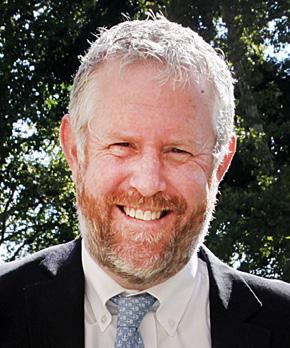
Most of the children we admit to the Sarah Dooley Center for Autism have a history of behaviors that might suggest they ‘just want to be left alone.’ One of the first things we do when a new student is admitted is approach them gently, quietly get down on their level, and simply hold out our hand. Many times, their first connection with us is reaching out and taking it. It’s the first step to building a meaningful, respectful relationship. Because we assume all of our children want to connect, they just struggle with how.
Adam Dreyfus is a Board Certified Behavior Analyst. He has served as Senior Director of the Sarah Dooley Center for Autism since 2013, and currently serves on the Virginia Board of Education’s Special Education Advisory Committee.
@sjv_richmond
@st.josephs.villa
@stjosephsvilla
How to navigate and access housing resources
By Erica Holmes, MS, CHC – Senior Director, Flagler Housing & Homeless Services
A record-breaking number of people are facing homelessness or housing poverty as rents continue to rise amidst the national shortage of affordable housing. Families confronted by traumatizing events like eviction don’t always know where to seek assistance, especially without natural supports to help. The Villa’s Flagler Housing & Homeless Services team is trained to meet our neighbors where they are, and present the most viable resources for maintaining housing, or obtaining a safe and affordable place to live as quickly as possible.
Flagler serves individuals and families in housing crisis throughout Richmond and the Tri-Cities region, using the community-based model of rapid rehousing. The process of accessing services varies depending on the client’s area of residence. If you are at risk of eviction, or experiencing homelessness, these are the first steps to take –
Greater Richmond Continuum of Care
• Call the Homeless Connection Line at 804.972.0813 if currently homeless or within 3 days of losing housing.
• Call the EmpowerNet 24/7 hotline at 804.612.6126 if fleeing domestic violence.
• You can also help us assist an individual or family experiencing homelessness by letting us know where they’re located. Simply go to bit.ly/RVAOutreach and complete the form. Our region’s outreach team will attempt to connect and provide support services as needed.
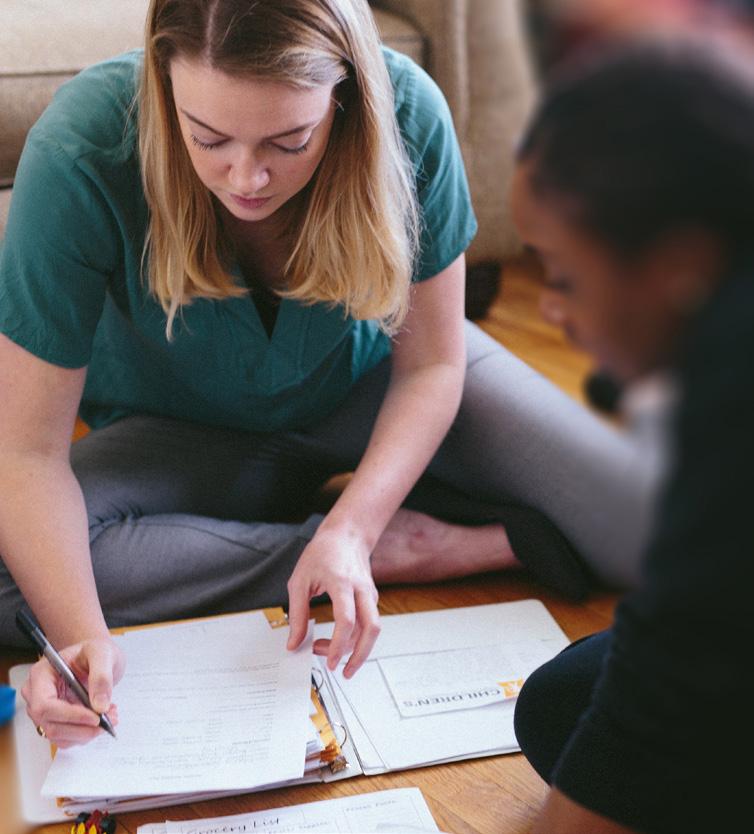

Tri-Cities – Crater Area Coalition on Homelessness
Colonial Heights, Dinwiddie, Emporia, Greensville, Hopewell, Petersburg, Prince George, Surry, and Sussex
• Call the Flagler Housing Resource Center at 804.722.1181 ext 101 or Commonwealth Catholic Charities Outreach at 804.467.7181 if currently homeless.
• Call our Youth Outreach Specialist at 804.615.9416 if age 18-24. Flagler’s Youth Outreach Specialist goes directly to clients and offers services including survival supplies, individual assessments, crisis intervention, transportation, and follow-up support.
• Call the James House at 804.458.2840 if fleeing domestic violence.
Not every person who reaches out to Flagler requires intense case management or financial assistance. Our Prevention and Diversion Case Managers educate individuals on resources to tap into before becoming homeless, and quickly assess their situation to see if a resolution can be reached. We engage in conversations about next steps, goals to achieve, and how housing can be maintained. That way, when Flagler is no longer in the picture, our clients are informed on what resources exist in the community, and know where to turn if they need a helping hand.
Erica Holmes has 21 years’ experience in the housing & homeless services field. She has served on several boards including the Crater Area Coalition on Homelessness, and is a member of Leadership Metro Richmond’s Class of 2022.

Donor Spotlight: Richmond Region Antique Automobile Club of America
(AACA)
AACA’s Annual Car Show and Swap
Meet has attracted hundreds of new visitors to the Villa since our campus became home to the event in 2017. Featuring an impressive line-up of vintage vehicles that spans our front fields, fascinating exhibits, antique car rides, and youth judging programs, the family-friendly show has something for everyone. And since 2017, AACA and its members have donated more than $75,000 to Villa programs!
Beyond their generous financial philanthropy, AACA is a committed partner in raising awareness of our work. Last year, as a special gift just for our students and staff, they brought us an Antique Car Parade to celebrate the holiday season. Cars dating back to 1911 cruised around campus – followed by Santa driving a ‘56 Corvette – in what was truly a memorable day for our Villa family.
We’re grateful for our AACA friends and are already looking for ward to next year’s Car Show. Save the date for June 10, 2023!
Innsbrook Classic: Making an Impact on the Golf Course


On Monday, June 13th, the Villa welcomed 42 teams and 168 golfers to the Federal Club for the 38th annual Innsbrook Classic. The heat didn’t stop us from having one of our most successful tournaments to date, raising nearly $90,000 in support of the Villa’s children and families.

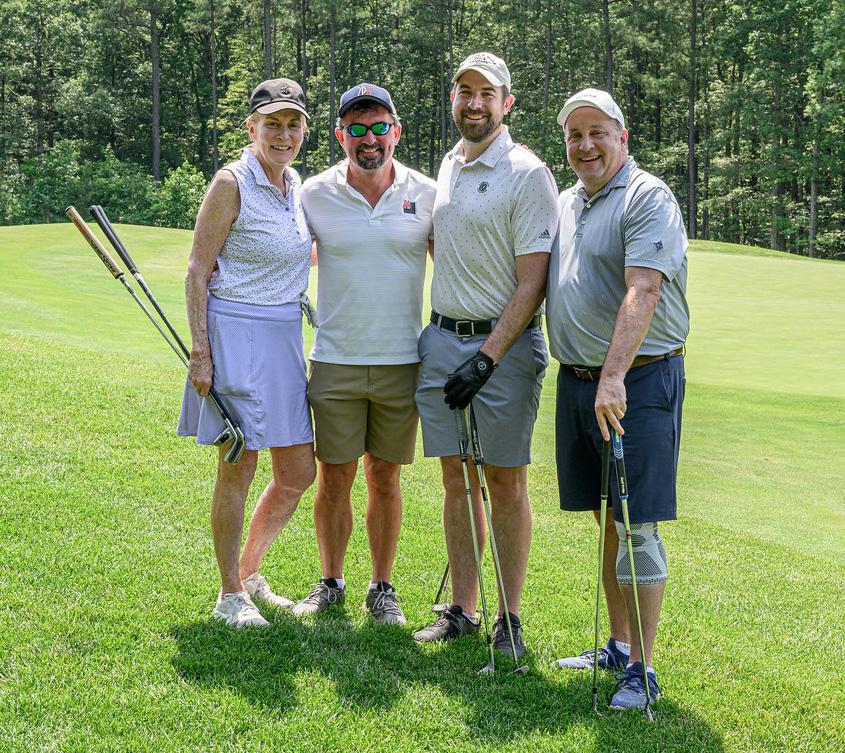



For the first time in tournament history, we held 2 flights of play due to over whelming interest. This allowed us to accommodate every team that wanted to support the Villa’s mission while ensuring a great player experience.
Also new to the tournament this year was real-time tournament scoring via the Golf Genius app, exciting raffle prizes, and additional challenge holes for the golfers!

“We are so grateful for our 13-year partnership with the Innsbrook Owners Association, and cannot thank them enough for all of their efforts to make this tournament such a success,” said CEO-elect Jenny Friar. “Of course, we could not do this without all of our sponsors, board members, committee members, volunteers, golfers, and staff. It truly takes a Villa!”
Congratulations to our overall winners from Page Auto Group, who shot a 55 (-17) in our team scramble to take home the Innsbrook Cup!
Interested in joining us next year? Save the date for the 39th annual Innsbrook Classic on Monday, June 12, 2023!
Team registration, opportunities for sponsorship, and more details will be available soon at www.innsbrookclassic.org.
Signature Sponsor Presenting Sponsor Supporting Sponsors
Plan now to invest in the future of the Villa!
With the new school year in full swing, what better time to take a trip back into the classroom for a quick overview of Planned Giving!
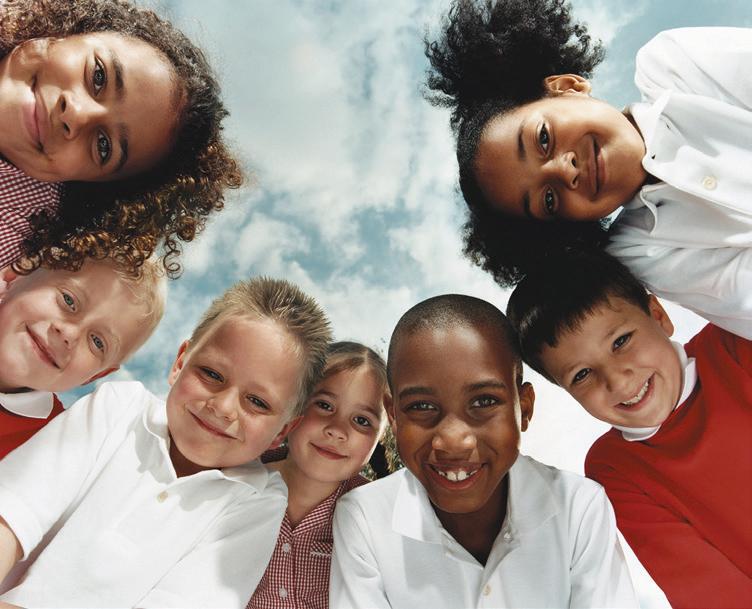

Planned Giving may seem overwhelming to understand at first, so we wanted to share a primer to help simplify what planned giving is (and isn’t), how you can leverage a planned gift to your financial advantage, and show you how easy it is to include the Villa in your estate plans!
What is Planned Giving?
A planned gift is a contribution that you arrange now, and is realized at a future date. A gift through your will is a meaningful way to support the Villa while preserving resources for your needs today.
It can be as simple as:
Leaving a specific amount, percentage or residual of your estate to the Villa; or
Naming the Villa as a beneficiary of your IRA, retirement plan, life insurance policy, or financial account.
What are the benefits of a Planned Gift?

Benefits include membership in the Archway Society and invitations to special events and programs. If you have already included a gift for the Villa in your estate plan, please let us know so that we can thank you and welcome you to the Archway Society.
In addition, the tax benefits of a planned gift can be very advantageous, but the specifics will vary with everyone’s circumstances and goals. Please consult with your attorney, financial advisor, estate planner, or accountant before making any arrangements.
I’m not old enough to be thinking about this… It’s never too early to start thinking about a planned gift. The average age at which donors make their first planned gift is 53, and one of the most transformational ways to support the future of the Villa is through a planned gift.
Always remember that a Planned Gift is:
A gift that affirms you will have the greatest impact to the Villa according to your wishes; Customizable to create the best fit for your financial needs and objectives; How you can leave your legacy at St. Joseph’s Villa; For everyone!
A Planned Gift is not:
Limited to a donor’s current wealth; Only for individuals over a certain age; Something that requires a will or legal document, or that can’t be changed over time; Complicated!
Ready to learn more? For more information about how to start building your legacy at the Villa, please visit www.sjvarchwaysociety.org or contact:
Thanks to Lewis Insurance Associates for sponsoring this newsletter. P.J. Shaver, CFRE Major Gifts Officer pshaver@sjvmail.net 804.553.3220
proudly supports St. Joseph’s Villa
www.lewisins.com
* St. Joseph’s Villa, its employees, and representatives do not offer legal or financial advice. × × × ×
BACK TO SCHOOL: SUPPORTING YOUR CHILD’S MENTAL HEALTH
HOW TO NAVIGATE HOUSING RESOURCES
8000 Brook Road • Richmond, VA 23227 804.553.3200 • NeverStopBelieving.org
St. Joseph’s Villa Board of Trustees
Kathleen C. Duke , Chair
Christopher M. Layne , Chair-Elect
Kathleen Burke Barrett, Executive Vice President
Mark D. Nichols , Secretary
Suzanne K. Hinton, Treasurer
Donald Alexander
Byron D. Berry
Louise Foster
Lee Ann Gudorp
Yvonne Mastromano
Darren J.Nolt
Lauren W. Waller
Linda M. Warren
Katina Williams
Richard P. Wintsch
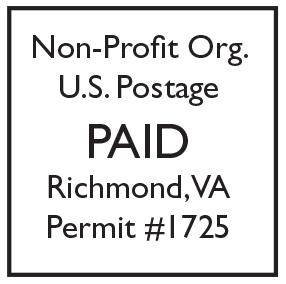
Thomas S. Zachry
We never stop believing in children and their families.
NEW PROGRAM
Outpatient Behavioral Therapy
Outpatient Behavioral Therapy (OBT) launched in 2021 as a clinic-based expansion of our In-Home Behavioral Treatment services. Our clinicians partner with the whole family to create individualized service plans for children with developmental disabilities, with the goal of managing challenging behaviors, increasing positive interactions, and preventing out-of-home placement.
Each child and family receive:
• Comprehensive assessment
• Individualized Service Plan
• Case collaboration in order to coordinate with outside services, including speech therapy, psychiatry, and school
• 24-hour response
While the clinic operates on the Villa’s 82-acre campus, services can also be provided at home. OBT is part of Medicaid’s Early Periodic Screening, Diagnostic & Treatment (EPSDT) program.
For more information about Outpatient Behavioral Therapy at the Villa, please contact our Admissions Office at 804-553-3241.
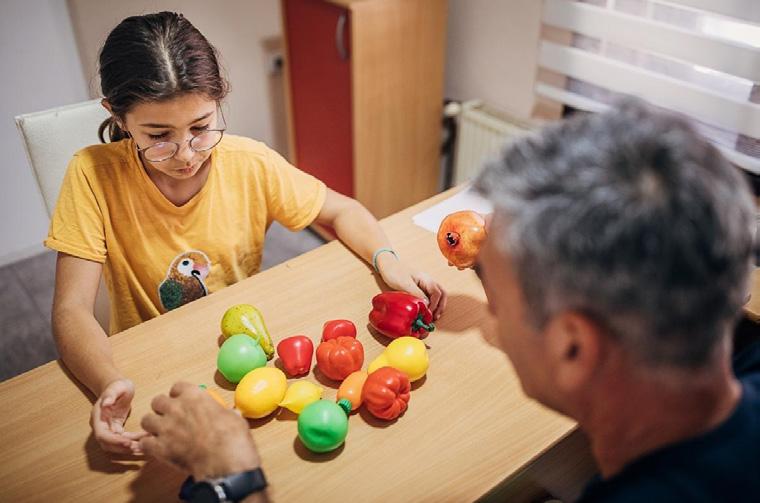
The Newsletter of
Joseph’s Villa
St.
Inside: ONE OF THE BIGGEST MISCONCEPTIONS ABOUT AUTISM









 The Villa’s mental and behavioral health services take a holistic, trauma-informed approach to care for children and families.
The Villa’s mental and behavioral health services take a holistic, trauma-informed approach to care for children and families.




















